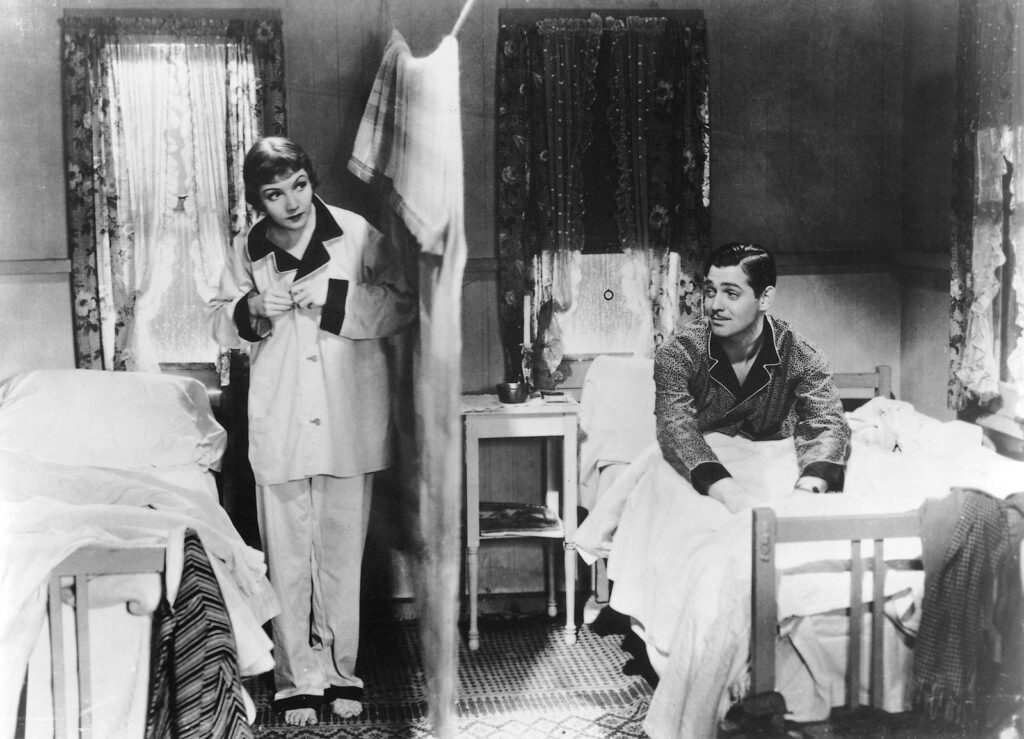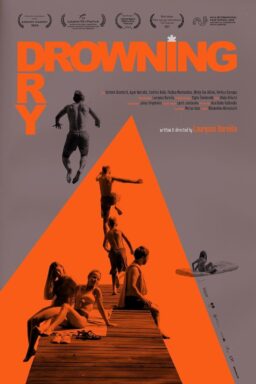Editor’s note: This article appeared originally on moviemezzanine.com. It is reproduced here by permission. Read more film-related content at moviemezzanine.com.
We get so used to some movies simply being around that our own praise for them may itself become a cliché. The minute “It Happened One Night” is brought up, a handful of old chestnuts gets inevitably evoked: its classic status as the ultimate romantic comedy, its Oscar Crown glory and its contribution to the alleged demise of undershirt sales in the U.S. (did anyone ever fact-check that one, by the way?). It’s not until we watch the movie again—preferably on a big screen and with a responsive audience, that we may rediscover how truly great it is. “It Happened One Night” is one of the easiest movies to love and one of the hardest to think of as a work of art.
The story is that of a spoiled heiress, Ellen Andrews (Claudette Colbert) rebelling against her mogul dad (Walter Connolly) and marrying a celebrity aviator King Westley (Jameson Thomas)—only to spend most of the film trying to reunite with him and discovering she’s really in love with a wisecracking reporter named Peter Warne (Clark Gable). Ellie is both clueless and stubborn, conceited and playful—there’s a streak of wit and resilience about her that makes Peter see her as both a scoop and a catch. He offers her help in getting to Westley in exchange for her story. By the end of the film Ellie elopes again. This time it’s from, not towards Westley.
For all the freshness of Robert Riskin’s screenplay (adapted from a short story by Samuel Hopkins Adams), the Gable/Colbert dynamics of constant reproach and attraction owes a lot to “Much Ado About Nothing’s” pair of Benedick and Beatrice. (It will also get successfully replayed between Gable and Vivien Leigh in “Gone With the Wind“, another story of a spoiled heiress being wooed by a rugged and gallant smartass not giving a damn.) The movie extends attraction of wits into attraction of bodies and remains still sexy as hell: the Walls of Jericho scene, with an old blanket serving as an all-too-wobbly chaperon, is shot as luridly as anything in Joseph Von Sternberg high-end pervy extravaganzas of the same era.

Pauline Kael famously said that American comedies of 1930s presented marriage and courtship as a vaudeville act, and love is indeed equaled with roleplaying throughout “It Happened One Night”. Peter and Ellie first click as a couple when they act out an impromptu scene to dupe the detectives sent by Ellie’s father. The entire mock-fight, taking place in a camping bungalow amidst lovingly depicted morning disarray, serves as the first instance of intimacy that’s enjoyed by both Peter and Ellie. As they impersonate conjugal strife all too plausibly (can it be that we get a glimpse into their much later married life?), they take physical pleasure in suddenly becoming a working-class bickering couple.
The scene also includes one of the loveliest and most erotic pieces of business in the film: as soon as the detectives leave, Peter kneels before Ellie and buttons up her blouse, all the while congratulating her on the performance she just gave. He doesn’t have to look down her cleavage to signal his desire: putting on some clothes had rarely been that sexy (a point made even stronger by the fact that there’s hardly a costume change in the film—Peter and Ellie are like a pair of commedia dell’arte mimes, putting on identities even as their costumes remain the same). Even more than “Dirty Dancing, It Happened One Night” is a movie in which sexual bliss is signified by lovers’ harmony as performers.
For a story bearing visible traces of “The Taming of a Shrew” all over it, there’s surprisingly little chauvinism to “It Happened One Night”. Ellie does get spanked, but it’s a playful gesture not meant at doing harm (though I bet Amanda Bonner of “Adam’s Rib” would beg to differ). What’s crucial is that Peter doesn’t want Ellie to change, but simply to join him in his folly (“I’m a little screwy myself!”). The film is by no means a taming vehicle for its heroine: the second Ellie’s father slaps her for disobedience, Capra makes it clear both him and his daughter are shocked by the gesture; the immediate regret is as palpable and salient as the tears welling up in Ellie’s eyes.

Besides, Peter’s machismo and bravado are jabbed at so frequently in the course of the action (most spectacularly in the mock-phallic hitchhiking scene, when Peter’s thumb is revealed as lacking and less powerful than some of Ellie’s parts), that the whole film is blissfully devoid of the same masculine triumphalism that marred genuine classics like “Woman of the Year” and “The Philadelphia Story”. In fact, some scenes of lengthy discussions of everyday minutiae, such as donut-dunking or the right definition of piggybacking, have a proto-Seinfeldian feel to them. It’s not difficult to see Peter and Ellie as pre-sexual revolution incarnations of Jerry and Elaine, who don’t sleep with each other before both marriage and Peter’s status as a breadwinner are secured.
Of course, this being a Frank Capra film, “It Happened One Night” is a Depression Era movie through and through. Apart from all the images of people traversing the country in search for jobs (bits as subliminal as they are persistent), and apart from constant hints at hunger and class divisions, there’s also the widespread fascination with mass media and news itself. No true 1930s comedy can get by without at least one desperate call for “holding the presses”, and Capra’s film is no exception, thanks to Charles C. Wilson’s wonderfully aggravated newspaper editor (itself a fossil in our post-printing-press eyes). The film bristles with popular culture references of its era: Peter impersonates a Warner Brothers’ gangster to scare the obnoxious passenger named Shapley (Roscoe Karns), as well as subverts the hit song from Disney’s Silly Symphony of the year before, making it clear that only virgins are afraid of the “Big Bad Wolf”.
As for the obligatory soupçon of saccharine (it may be telling that the one word a telegraph clerk Peter talks to has trouble spelling is ‘mush’), Capra doesn’t lay it on as thickly here as in some other films (such as that pre-“Cheers” utopia of oddballs, “You Can’t Take It With You”). The communal singing of “The Man on the Flying Trapeze”, which interrupts the action and morphs into a wonderfully democratic vision of the night bus as a society in eternal transit, is capped by the movie’s most shameless grab at our heartstrings. A mother passes out from hunger and her little boy is telling the story of her hardship: the cloying effect is only strengthened by the fact that Claire McDowell (playing the Mom) looks like she’s been transferred whole from any of the fifty D.W. Griffith silent shorts she appeared in between 1908 and 1913. Still, even this relatively cheap bit is finished off with a joke, when Peter pretends to be a millionaire despite just becoming more broke than ever before.

“It Happened One Night” is a deeply Emersonian movie, and—by extension—a deeply American one. King Westley is a faintly British, aristocratic milquetoast: even his skills as a pilot don’t lend him any virility and instead are presented as a mere fad that Peter looks down upon. It’s Gable’s character who embodies self-reliance and utopian thinking that mark all American dreamers: his vision of a life on a remote island is as impractical as it’s alluring in its complete independence to hierarchies of rank and affluence. In the end, all he wants is the $39.60 owed to him and the girl he loves.
Last but not least: for all its humor, sexiness and wisdom, “It Happened One Night” is also damn beautiful to look at. Joseph Walker’s cinematography can be both gritty and gauzy, focusing on tiny confined spaces and on vast open ones (one of my favorite shots in the film is the one following Peter and Ellie down the road they walk—when they both look back at us it’s almost as if they were checking if we’re still following their story). Capra’s propensity for long takes is evident throughout, with some immobile set-pieces serving as exemplary instances of comic timing, while others achieve wonderful realism by simply moving through long stretches of space.
Eighty years after being made, “It Happened One Night” remains a mirror and a measuring stick—not only for all subsequent romantic comedies, but also (perhaps more significantly) for all lovers who came after Peter and Ellie and dream of a similar union of bodies, wits and fates.
For Steven Boone, whose description of ‘Arthur’ (a direct heir to this movie) still has yet to leave my head.












